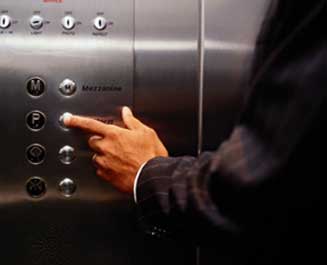Push the
Right Buttons
The
Elevator
Speech

IN THE TIME IT TAKES TO RIDE AN ELEVATOR WITH A STRANGER � sixteen seconds � you can begin to form a
new business relationship. It�s done with your Elevator Speech.
An elevator speech is a mini-speech that succinctly tells people who you are, what you do, and, more
importantly, what it can do for others. It�s an introductory paragraph that is given conversationally,
when meeting a stranger. It is an expression of you, and should showcase your strengths as they relate
to your listener.
By being poised, polished and
prepared for your sixteen
seconds of fame you can ride
your elevator speech from
the streets to the suites!
Hi, I�m Craig Harrison, I market confidence! I�m a speaker, trainer and consultant who helps others
communicate with confidence and clarity. Through keynotes, training, and coaching I make complex
communication fun & easy. Let me help you become a more effective communicator. I�d love to work with you.
Here�s my card. May I please have one of yours?
My speech is just a few sentences long and changes slightly each time I give it. It�s been scripted,
rehearsed and honed over months of delivery.
Elements of the Elevator Speech
Your elevator speech should consist of your name and title, company, and something special about yourself:
your talents, experience, or approach. Remember, the goal is to stand out from the crowd so be memorable.
What You Say And How You Say it
Pronounce your name clearly. It helps to be upbeat. Smile. Perhaps you�ll press a card into their palm, or
give strangers a mnemonic or other easy way to remember you.
What Makes You Special?
The world is already full of salespeople, marketers and entrepreneurs. Put a special spin on your talents
or occupation. One of many
management consultant I know starts her elevator speech by telling �I keep your company out of
Dilbert�s comic strip.� That captured my attention, and showed me she is excited about her craft,
and that she also has a sense of humor.
Give it a Twist
Represent your occupation in its most ennobling light. A plumber jokingly reminds listeners that
�a flush always beats a full house.� An IRS agent refers to himself as a �government fundraiser.�
A midwife �brings life into this world.� These phrases invite further inquiry.
Credentials
Share your qualifications such as special skills, degrees, or experience. Are you an award winning
graphic designer, the Chamber of Commerce�s entrepreneur of the year, or recently profiled in Who�s
Who of California? Accentuate these distinctions.
Strangers subscribe to WIFM
Others naturally want to know �What�s in it for me?� Your speech should phrase your skills in terms
of benefits to their company. Here are examples for technical and non-technical job seekers:
�Hi, I�m Steve Zebriskie, I�m one of the few, the proud, the remaining COBOL programmers! I was a pioneer
in business data processing. With 10 years of experience modifying embedded systems I�m available immediately
to assist you with your lingering Y2K problems. Call on me if I can be of service. My e-mail address is
[email protected].�
Ask a Question
As job seekers you should elicit more information: �Who currently supplies your hardware?� or �Does
your group hire contractors?� Gather more information.
The ride is just beginning. Craft your sixteen second sound bite. Hone it among friends, acquaintances
and record it on your answering machine to hear how confident you sound. By being poised, polished and
prepared for your sixteen seconds of fame you can ride your elevator speech from the streets to the suites!
Craig Harrison is a speaker, trainer and communications consultant. To contact Craig Harrison, visit his website at www.craigspeaks.com.
<� current articles